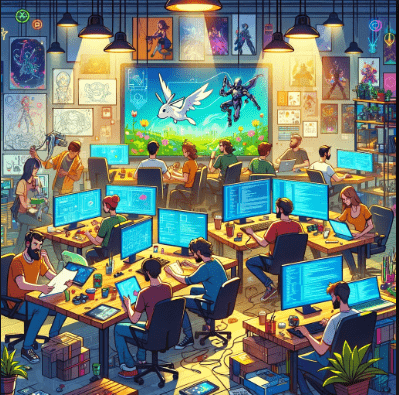Introduction
In the fast-paced world of game development, the integration of artificial intelligence (AI) has emerged as a game-changer, revolutionizing the creation of immersive and dynamic gaming experiences. This comprehensive exploration delves into the realm of AI-driven game development support services, uncovering how IT services leverage AI to empower game developers in crafting intricate gaming environments, from non-player character (NPC) behavior to dynamic storytelling. From its inception to recent advancements, we embark on a journey through the intricate web of technology that fuels the evolution of game development.
Understanding AI-driven Game Development Support Services
AI-driven game development support services encompass a myriad of tools, algorithms, and frameworks designed to augment the creative capabilities of game developers. By harnessing the power of machine learning, natural language processing, and computer vision, these services enable developers to automate tedious tasks, optimize game mechanics, and enhance player engagement through personalized experiences.
The Evolution of AI in Game Development
The integration of AI in game development has evolved significantly over the years, from basic pathfinding algorithms to sophisticated neural networks and deep learning models. Early examples of AI-driven game development support services include behavior trees for NPC AI, procedural generation algorithms for world-building, and sentiment analysis for dynamic storytelling. However, recent advancements in AI technology, coupled with the availability of vast datasets and cloud computing resources, have propelled the development of next-generation AI-driven tools and frameworks.
Key Components of AI-driven Game Development Support Services:
- NPC Behavior Modeling: AI-driven game development support services enable developers to create lifelike NPC behaviors through techniques such as reinforcement learning and imitation learning. By simulating human-like decision-making processes and adapting to player interactions, NPCs can exhibit complex behaviors and personalities, enhancing the overall immersion and realism of the gaming experience.
- Dynamic Storytelling: AI algorithms analyze player choices and actions in real-time, dynamically adjusting the narrative flow and outcome of the game. Through techniques such as procedural narrative generation and adaptive dialogue systems, developers can craft branching storylines and personalized experiences tailored to individual player preferences, fostering deeper engagement and emotional resonance.
- Content Generation and World-building: AI-driven tools automate the generation of game content, including terrain, textures, and assets, allowing developers to create vast and diverse game worlds efficiently. By leveraging generative adversarial networks (GANs) and procedural content generation (PCG) algorithms, developers can explore infinite possibilities and iterate rapidly, unleashing their creativity without the constraints of manual content creation.
- Player Behavior Analysis: AI algorithms analyze player behavior patterns and preferences, extracting valuable insights to optimize game design and monetization strategies. Through techniques such as player segmentation and churn prediction, developers can tailor gameplay experiences, offer personalized recommendations, and maximize player retention and revenue.
Challenges and Opportunities
While AI-driven game development support services offer immense potential, they also pose several challenges, including algorithmic bias, data privacy concerns, and ethical implications. Furthermore, integrating AI into game development workflows requires specialized expertise and infrastructure, presenting barriers to entry for indie developers and smaller studios. However, these challenges also present opportunities for collaboration, innovation, and community-building within the game development ecosystem.
Conclusion
In conclusion, AI-driven game development support services represent a paradigm shift in the way games are conceptualized, created, and experienced. By harnessing the power of AI, developers can push the boundaries of creativity, storytelling, and player engagement, delivering immersive and memorable gaming experiences that resonate with audiences worldwide. As technology continues to evolve and AI algorithms become more sophisticated, the future of game development holds limitless possibilities, driven by the relentless pursuit of innovation and excellence.
Engagement and Call to Action
Are you ready to embark on a journey into the future of game development? Join us in exploring the transformative potential of AI-driven game development support services and shaping the next generation of interactive entertainment. Your feedback and contributions are invaluable as we continue to push the boundaries of innovation and creativity in the world of gaming. Together, let’s unlock new dimensions of storytelling, immersion, and player empowerment through the power of AI.



